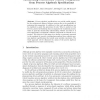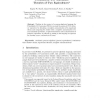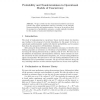113
click to vote
COORDINATION
2006
Springer
15 years 5 months ago
2006
Springer
How to coordinate the processes in a complex component-based software system is a nontrivial issue. Many different coordination approaches exist, each with its own specific advanta...
130
click to vote
COORDINATION
2006
Springer
15 years 5 months ago
2006
Springer
Process algebraic specifications can provide useful support for the architectural design of software systems due to the possibility of analyzing their properties. In addition to th...
127
click to vote
COORDINATION
2006
Springer
15 years 5 months ago
2006
Springer
The coordination language Paradigm allows for a flexible and orthogonal modeling of interprocess relationships at the architectural level. It is shown how dynamic system adaptation...
135
click to vote
COORDINATION
2006
Springer
15 years 5 months ago
2006
Springer
In this paper we investigate the relationship between two problems, related to distributed systems, that are of particular interest in the context of Service Oriented Computing: at...
127
click to vote
COORDINATION
2006
Springer
15 years 5 months ago
2006
Springer
Abstract. Constraint automata have been used as an operational model for component connectors that coordinate the cooperation and communication of the components by means of a netw...
113
click to vote
COORDINATION
2006
Springer
15 years 5 months ago
2006
Springer
We tackle the problem of providing rigorous formal foundations to current software engineering technologies for web services. We focus on two of the most used XML-based languages f...
108
click to vote
CONCUR
2006
Springer
15 years 5 months ago
2006
Springer
Abstract. We present a capability calculus for checking partial confluence of channel-communicating concurrent processes. Our approach automatically detects more programs to be par...
CONCUR
2006
Springer
15 years 5 months ago
2006
Springer
121
click to vote
CONCUR
2006
Springer
15 years 5 months ago
2006
Springer
Working in the context of a process-algebraic language for Probabilistic I/O Automata (PIOA), we study the notion of PIOA behavior equivalence by obtaining a complete axiomatizatio...
107
click to vote
CONCUR
2006
Springer
15 years 5 months ago
2006
Springer
We give a brief overview of operational models for concurrent systems that exhibit probabilistic behavior, focussing on the interplay between probability and nondeterminism. Our su...



